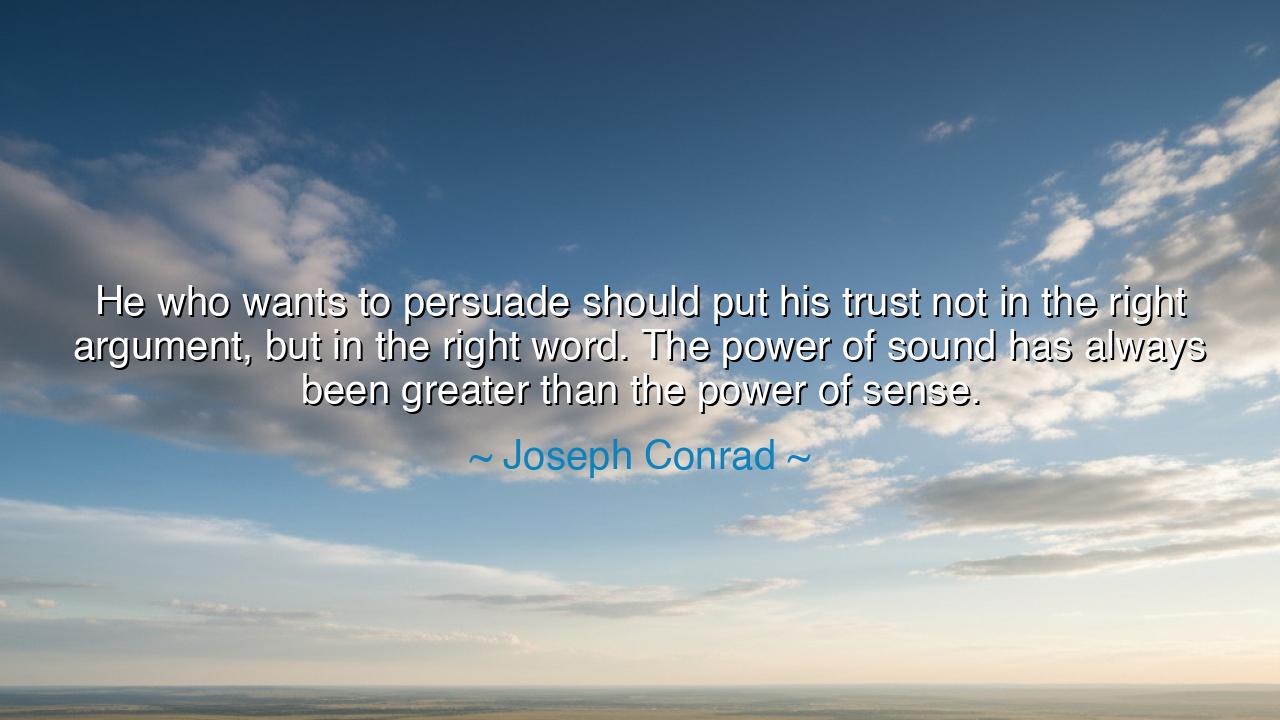
He who wants to persuade should put his trust not in the right
He who wants to persuade should put his trust not in the right argument, but in the right word. The power of sound has always been greater than the power of sense.






Hear, O seeker of wisdom, the words of Joseph Conrad, who pierced through the illusions of men and declared: “He who wants to persuade should put his trust not in the right argument, but in the right word. The power of sound has always been greater than the power of sense.” This teaching is not an insult to reason, but a revelation of the human heart. For though logic may be perfect, it is the word, shaped with rhythm and breath, that pierces the soul. A thousand truths may be laid bare, yet if they are spoken without the magic of sound, they fall lifeless upon the ear.
What Conrad unveils is the ancient law of persuasion: that men are moved less by reason than by language, less by sense than by sound. The heart responds to music before it responds to mathematics; the masses are stirred by a cry of fire more swiftly than by a dissertation on danger. A well-crafted argument may convince the mind, but the right word, timed with passion, ignites the spirit. Thus it has always been, from the orators of Greece to the poets of every age.
Consider the tale of Demosthenes, the Athenian orator, who faced not only the power of Macedon but the apathy of his own people. His arguments were sound, filled with reasons why Athens must rise. Yet it was not logic alone that roused them—it was his words, thundered with cadence, sharpened by tone, heavy with conviction. His enemies feared not his reasoning, but his voice, for it could stir men to action, turn citizens into warriors, and transform doubt into resolve. This is the power Conrad speaks of: the power of sound greater than the power of sense.
History bears countless echoes of this truth. Abraham Lincoln, in his Gettysburg Address, spoke fewer than three hundred words. He did not weave long arguments about the Union or the Constitution. Instead, he gave the world words like “government of the people, by the people, for the people,” words that resound with rhythm and simplicity, words that outlive volumes of political discourse. The right words, carried upon the breath of sincerity, moved more hearts than endless speeches could ever have done.
O children of the future, hear this lesson: do not despise reason, but do not forget that men and women are creatures of the ear as much as of the mind. When you would persuade, do not merely gather arguments like stones in a basket. Shape them into words that sing, words that ring with rhythm, words that strike like the hammer or soothe like the harp. For logic feeds the mind, but it is the word that stirs the will to act.
The lesson for life is radiant: whether you are leader or teacher, friend or parent, your power lies not only in what you know, but in how you speak it. A truth spoken poorly may be ignored, but a truth spoken beautifully may live forever. Thus, when you open your mouth, let your words be chosen with care. Let them be clear, let them be strong, let them be alive. For the power of sound carries truth to places that sense alone cannot reach.
Practical action is this: practice the art of speaking. Learn rhythm from the poets, strength from the prophets, gentleness from the peacemakers. When you write, weigh your words as a jeweler weighs gems. When you speak, let tone, pause, and cadence be your allies. Above all, speak with sincerity, for the heart can detect falsehood even in the most polished phrase. Let your words carry the weight of truth, clothed in the beauty of sound.
So remember Conrad’s wisdom: “The power of sound has always been greater than the power of sense.” Use words not to deceive, but to awaken; not to flatter, but to guide; not to dominate, but to inspire. For when reason is joined with the right word, mountains may be moved, nations may be stirred, and the soul of mankind may rise to greater heights.






AAdministratorAdministrator
Welcome, honored guests. Please leave a comment, we will respond soon